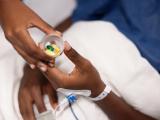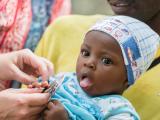World leaders today made a commitment to work at national, regional, and global levels to address the growing threat of antimicrobial resistance (AMR).
The agreement came at the 71st meeting of the United Nations (UN) General Assembly, where delegates gathered today for a high-level meeting on AMR. It's only the fourth time the UN has held a General Assembly meeting to address a health issue, a fact that underscores how seriously world leaders take the threat of drug-resistant pathogens. Before the meeting, delegates agreed to a draft political declaration in which they committed to developing and implementing national action plans to address rising drug resistance.
"Antimicrobial resistance poses a fundamental, long-term threat to human health, sustainable food production and development," UN Secretary-General Ban Ki-moon told the assembled delegates. "We are losing our ability to protect both people and animals from life-threatening infections."
An urgent threat
The declaration acknowledged that the increasing resistance of microorganisms to antimicrobial medicines is mainly a product of inappropriate use in the human, animal, food, and agriculture sectors. It also noted that without immediate action, unchecked resistance to antibiotics in particular is the "greatest and most urgent threat," a challenge that threatens to wipe out the gains made against infectious diseases in the 20th century and hamper efforts to reach the UN's sustainable development goals.
An estimated 700,000 people die each year from drug-resistant strains of common bacterial infections, HIV, tuberculosis, and malaria. That figure includes 200,000 newborns who die from infections that don't respond to antibiotics. But a 2014 report from the Review on Antimicrobial Resistance projected that if rising AMR is not addressed, the annual death toll could reach 10 million by the year 2050, with low- and middle-income nations bearing much of the burden.
In committing to the draft declaration, the member states agreed to a blueprint for combating AMR that was put forward by the World Health Organization (WHO) in 2015. The WHOs global action plan called for nations to improve public awareness and understanding of AMR, increase surveillance for drug-resistant organisms, reduce the incidence of infection through improved sanitation and hygiene, promote antimicrobial stewardship in human and animal health, and increase investment in new antibiotics, diagnostics, and vaccines.
"The commitments made today must now be translated into swift, effective, lifesaving actions across the human, animal and environmental health sectors," said Margaret Chan, MD, Director-General of the WHO. "We are running out of time."
Action plans must address human, animal health
Now, the heavy lifting will have to be done by individual nations, who are being tasked with developing surveillance systems for drug-resistant bacteria, regulating the sale and use of antibiotics, raising public awareness, and promoting proper use of antibiotics. For some countries, especially the developing nations, this will be a challenge. And as several speakers made clear, these efforts must address many different sectors.
"AMR is a problem not just in our hospitals, but on our farms and in our food, too," said José Graziano da Silva, PhD, director-general of the UN Food and Agriculture Organization (FAO). "Agriculture must shoulder its share of responsibility, both by using antimicrobials more responsibly and by cutting down on the need to use them, through good farm hygiene."
Da Silva said antibiotics should only be used to prevent infection in food-producing animals under strict circumstances, and that the use of antibiotics for growth promotion should be phased out immediately.
The agreement also called on countries to support the development and distribution of new antibiotics, diagnostics to quickly identify bacterial infections, and vaccines. Antibiotic development has lagged now for several decades because of the lack of financial incentive for drug makers, and most experts agree that new financial mechanisms—such as large, up-front cash prizes for companies that develop a new antibiotic—are needed to spur investment.
Agreement lacks specific targets
But the declaration did not set any targets for reduced use of antibiotics in humans and animals, which is something that many infectious disease experts have said is necessary if any progress is going to be made against AMR. Nor did it call on countries to make specific financial commitments to new antibiotic development. When asked by reporters about the lack of targets and financial commitments, Chan said that getting world leaders to acknowledge what she called a "neglected" issue is an important first step.
"To me, recognition by world leaders…is a historical moment," she said.
The agreement calls on the WHO, FAO, and the World Organization for Animal Health (OIE) to help coordinate these efforts and support countries in developing and implementing AMR action plans. The groups will report back to the UN in 2018 on the progress they've made in fulfilling the goals of the declaration.
See also:
Sep 21 UN draft political declaration on antimicrobial resistance
May 2015 WHO Global Action Plan on Antimicrobial Resistance
December 2014 Review on Antimicrobial Resistance report























